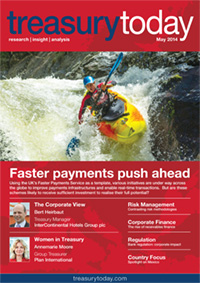Contents
- Editorial
- Unplug and play
- Women in Treasury
- Annemarie Moore, Plan International - Women in Treasury
- Question Answered
- Corporate pensions
- Market View
- US economy improving: but how much?
- Insight & Analysis
- Faster payments: potential versus reality
- Corporate Finance
- Receivables: overhauling working capital management
- Liquidity Investment Horizons: HSBC Global Asset Management
- Money market funds: making more of a changing world
- The Corporate View
- Corporate View: Bert Heirbaut, InterContinental Hotels Group
- Country Focus
- Mexico: trading up
- Risk Management
- Visions of risk
- Product Profile: Citi
- Managing emerging market liquidity
- Regulation
- Key trends in bank regulation
- Back to Basics
- Pooling: crossing the border
Editorial
Unplug and play
Without doubt, technology has revolutionised the way we work. But it has also altered the way we live. Mobile technology and remote access solutions allow us to work on the go, or work from home, yet in doing so, they have blurred the lines between our personal and professional lives.
For some employers, the ability to have their workers on tap 24/7 is highly desirable. In fact, many corporate cultures operate ‘unwritten rules’ expecting employees to respond to emails after hours, or continue to work on projects at weekends. Of course, there are always exceptional circumstances that demand an extra push, but when the working day is only broken up by eating and sleeping, the risk of burnout is high. And exhausted employees increased risk of error, absenteeism, stress and low morale, all of which will ultimately impact the bottom line.
In the corporate treasury function, where human resources tend to be stretched and accuracy is imperative, it is vital to have a team that is functioning at its best. This means recognising the difference between full capacity and full productivity – a trend which is gradually taking hold among key European multinationals, and even governments.
Volkswagen was one of the first movers here, announcing in 2011 that certain employees’ work emails would be ‘turned off’ 30 minutes after the end of their shift, and only switched on again half an hour before the beginning of their next working day. BMW and Puma have introduced similar initiatives, and the German employment ministry announced in August 2013 that its managers were banned from calling or emailing staff out of hours, except in emergencies.
Similarly, trade unions for the technical and digital sectors in France have recently struck a – legally binding – deal with employers stating that they can no longer pester staff with out-of-hours emails. In fact, employees in those sectors are being ordered to switch off professional mobile devices to sever any communication links in time designated for ‘rest’.
While banning out-of-hours email may be an extreme measure, not to mention totally impractical for treasurers working across time zones, these radical moves are designed to make a point. Namely that working longer doesn’t necessarily mean working harder.
As one of Treasury Today’s favourite forward-thinkers, Adam Smith, wrote in the Wealth of Nations, “The man who works so moderately as to be able to work constantly, not only preserves his health the longest, but in the course of the year, executes the greatest quantity of works.”
In short, it pays to let your employees unplug and play.


